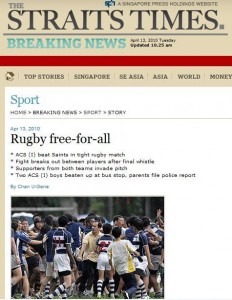
Readers of the Straits Times newspaper in Singapore would have seen the headlines “Rugby Free-For-All” on the front page of the April 13, 2010 issue of the newspaper.
A fight broke out between the St Andrew’s Secondary School and Anglo-Chinese School (Independent) rugby teams after the latter won the Schools National Under-17 Police Cup Final 8-7.
One of the players was injured in the mouth. According to newspaper reports, the player had a broken tooth.
From time to time, our clinic sees patients who have suffered trauma to the teeth and mouth whether through sports injuries or other accidents or falls. According to data from the Colgate website, dentists estimate that between 13% to 39% of dental injuries occur while playing sports.
Treatment Options
When a patient comes in to the clinic with such a problem,
- the first thing that needs to be done is to take an x-ray to determine whether there has been any fracture of the tooth (or teeth).
- The gums and surrounding teeth also need to be examined to see if they have been affected.
- If the tooth is mobile and tender, one option to preserve the tooth is to splint the tooth to the neighbouring teeth with a wire and composite bonding.
- Any teeth that are in otherwise good condition but chipped to varying degrees can be restored either through composite bonding or by fabricating a crown.
- If the extent of trauma suffered by the tooth is significant, root canal treatment may be required to restore the tooth, followed by fabrication of a crown.
- Where a tooth is knocked out, the dentist should determine whether there are any fragments of the tooth left in the socket and remove them completely. Depending on the dental condition of the patient, it may be possible to place a dental implant immediately into the socket of the tooth, followed by a crown shortly thereafter.
- In some situations, a bridge or a denture is used to close the gap left by the missing tooth.
Prevention is Better than Cure
According to the National Youth Sports Foundation for the Prevention of Athletic Injuries in the US, dental injuries are the most common type of oral facial injuries sustained while engaging in sporting activities. Athletes who do not take proper preventive measures (see below) may face lifetime dental costs that could add up significantly.
Some ways to minimize sports injuries, particularly injuries to the teeth and mouth include:
- Using properly fitted mouthguards especially for contact sports such as football, boxing, martial arts and hockey.
- Mouthguards are also recommended for other non-contact sports which can result in dental injuries such as bicycle riding, roller blading, soccer, skateboarding, baseball and wrestling.
- Use properly fitted helmets for activities that involve speed or impact
Watch this space for our next posting on what to do in the situation where a tooth is lost through a fall or other accident.





